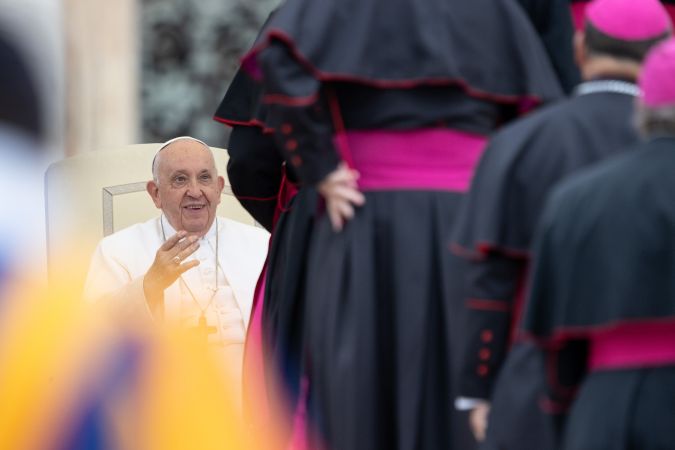
Throughout the history of the Catholic Church, cardinals and bishops have proposed concrete questions known as dubia, or "doubts," to receive affirmative or negative answers from the Holy Father or the competent Dicastery regarding the presented matter. In the recent history of the Church, starting from the end of the Second Vatican Ecumenical Council, dubia has been proposed relating to the most diverse issues, including those relating to the administration of the sacraments, the liturgy, and the binding nature of moral teaching.
Are the answers made public?
Most of the answers to dubia are provided by the Dicasteries of the Roman Curia—such as Divine Worship and the Discipline of the Sacraments and Doctrine of the Faith—which are competent for the matter affected by the questions proposed. These responses are usually preserved and published in the Acta Apostolicae Sedis, the collection of official documents of the Pope and the Roman Curia.
The most recent dubia: Synod on Synodality and Response to Amoris Laetitia
On the eve of the opening of the XVI Ordinary General Assembly of the Synod of Bishops dedicated to synodality in October 2023, five cardinals – Burke from the United States, Sarah from Guinea, Sandoval from Mexico, Brandmuller from Germany, and Zen from China – presented Pope Francis with five dubia concerning issues they anticipate will be addressed by the synodal assembly.
The issues concern divine revelation, the blessing of homosexual couples, the constitutive dimension of the Church, female priesthood, and forgiveness. To the five cardinals, the Pope responded in an explanatory way but did not express himself directly in a positive or negative sense concerning each dubium. Therefore, not satisfied with the Pontiff's responses, the five cardinals sent the dubia to the Pope again.
On the same day—October 2, 2023—that the text of the reformulated dubia of the five cardinals was made public, the only direct response to the dubia regarding Amoris Laetitia was also made public. In September 2023, the prefect of the Dicastery for the Doctrine of the Faith, Victor Manuel Fernandez, responded—on behalf of the Pope—to a series of questions posed the previous July by Cardinal Dominik Duka, Archbishop Emeritus of Prague, regarding the administration of the Eucharist to the divorced and remarried. The text of the responses was published on the website of the Dicastery for the Doctrine of the Faith.
Dubia with regard to Traditionis Custodes
After the publication of Pope Francis's Motu Proprio Traditionis Custodes dismantled Benedict XVI's previous Motu Proprio liberalizing the celebration of Mass according to the Roman Missal of 1962, eleven dubia were posed to the then Congregation for Divine Worship and the Discipline of the Sacraments regarding the interpretation of the new document.
On December 18, 2021, the Congregation published the "responsa ad dubia" on some provisions of Traditionis Custodes, answering specific questions on how the Motu Proprio should be implemented and further clarifying the restrictions on the traditional Latin Mass.
According to Traditionis Custodes, the Latin Mass could only be celebrated in non-parish churches, oratories, or chapels. But when a dubium was presented asking whether, in the event that none of these were available, the Congregation responded in the affirmative, permitting Mass in parish churches under a series of strict conditions stipulating that "such a celebration should not be included in the parish Mass schedule, since it is attended only by the faithful who are members of the said group," and "should not be held at the same time as the pastoral activities of the parish community."
Negative responses were given to the dubium regarding the possibility of celebrating the Sacraments with the Rituale Romanum and the Pontificale Romanum before the liturgical reform of the Second Vatican Council and to the case of a priest authorized to use the Missale Romanum of 1962 celebrating two Masses on the same day. This combination, the Congregation stated, is impossible to grant because the case of "just cause" or "pastoral necessity" required by the Code of Canon Law does not occur.
Dubia regarding the blessing of homosexual unions
On March 15, 2021, the Congregation for the Doctrine of the Faith published a responsum to a dubium regarding the blessing of homosexual unions.
The answer was negative: The Church does not have the power to give blessings to homosexual unions.
In the explanatory note, signed by the then-prefect Cardinal Ladaria Ferrer and the then-secretary Archbishop Morandi, it was also clarified that "in order to conform with the nature of sacramentals, when a blessing is invoked on particular human relationships, in addition to the right intention of those who participate, it is necessary that what is blessed be objectively and positively ordered to receive and express grace, according to the designs of God inscribed in creation, and fully revealed by Christ the Lord."
The response continues: "Therefore, only those realities which are in themselves ordered to serve those ends are congruent with the essence of the blessing imparted by the Church. For this reason, it is not licit to impart a blessing on relationships or partnerships, even stable, that involve sexual activity outside of marriage (i.e., outside the indissoluble union of a man and a woman open in itself to the transmission of life), as is the case of the unions between persons of the same sex. Furthermore, since blessings on persons are in relationship with the sacraments, the blessing of homosexual unions cannot be considered licit. This is because they would constitute a certain imitation or analog of the nuptial blessing invoked on the man and woman united in the sacrament of Matrimony, while in fact, 'there are absolutely no grounds for considering homosexual unions to be in any way similar or even remotely analogous to God's plan for marriage and family.'"
Dubia regarding Amoris Laetitia
Regarding the 2016 post-synodal apostolic exhortation Amoris Laetitia, the Italian Cardinal Carlo Caffarra, the American Cardinal Raymond Burke, and the German Cardinals Walter Brandmüller and Joachim Meisner presented five dubia to the Pope, in particular regarding the readmission of civilly remarried divorcees to the Eucharist and the validity of the teaching proposed by John Paul II in the encyclical Veritatis Splendor.
The cardinals have yet to receive a direct response to this dubia, but only an indirect pronouncement through a publication edited by Cardinal Francesco Coccopalmerio, then president of the Pontifical Council for Legislative Texts.
In his 2017 book entitled A Commentary on Chapter Eight of Amoris Laetitia, Cardinal Coccopalmerio—who participated in the Synod on the family as head of the Dicastery of the Roman Curia—argued that Catholic doctrine was respected in Amoris Laetitia.
Dubia during the pontificate of Benedict XVI
In 2012, during the pontificate of Benedict XVI, a dubium was proposed regarding the possibility for deacons to join with priests in renewing their priestly vows during the Chrism Mass. To this dubium, the Congregation for Divine Worship and the Discipline of the Sacraments responded negatively, explaining that "the Second Vatican Ecumenical Council, when it speaks of deacons, distinguishes them from presbyters and specifies their nature. In the Chrism Mass, therefore, only priests are called to renew their priestly promises since they participate together with the bishop in the same priesthood and ministry of Christ."
Four years earlier, in 2008 and therefore still during the pontificate of Benedict XVI, the Congregation for the Doctrine of the Faith intervened concerning a dubium regarding the celebration of Baptism. There were two questions. The first read: "Whether the Baptism conferred with the formulas' I baptize you in the name of the Creator, and of the Redeemer, and of the Sanctifier' and 'I baptize you in the name of the Creator, and of the Liberator, and of the Sanctifier' is valid?;" the second asked: "Whether the persons baptized with those formulas have to be baptized in forma absoluta?" The answers were negative for the first case and affirmative for the second.
Dubia under the pontificates of John Paul II and Paul VI
Also, during the long pontificate of John Paul II, there was no shortage of dubia and related responses. In 2001, the Congregation for Divine Worship and the Discipline of the Sacraments found itself faced with a dubium expressed with regard to the provisions concerning the celebration of the sacrament of Penance, with particular reference to the possibility of confessing during the celebration of Mass.
"The celebration of the sacrament of Penance," explained the Congregation, "is one of the proper ministries of the priest. It is evident that it is licit to confess during the celebration of Mass. If concelebration is taking place, it is earnestly requested that some priests abstain from concelebration such that they might be available to the faithful who desire to approach the sacrament of Penance."
In 1995, Cardinal Joseph Ratzinger, prefect of the Congregation for the Doctrine of the Faith, responded clearly to the dubium regarding female priesthood. The question asked whether the Church's teaching with regard to the rejection of women's ordination should be considered definitive. Cardinal Ratzinger—who ten years later would become Pope Benedict XVI—responded in the affirmative.
During the pontificate of Paul VI, in 1971—a few years after the end of the celebration of the Second Vatican Council—a dubium was proposed regarding the possibility or otherwise that lay people could also preach the homily. The answer was, of course, negative.
Finally, in 1965, a dubium was presented regarding the prayer of the faithful, whether or not it was obligatory during the celebration of Mass on weekdays. The answer was that the prayer of the faithful on weekday celebrations is not mandatory.
Translated, edited adapted by Jacob Stein.
This article was originally published on ACI Stampa.

Journalist based in Rome. He worked for 'Area' Press Agency, dealing with internal politics, economics but above all with the Vatican. Accredited at the Press Office of the Holy See, professional journalist since 2008, he followed the conclaves of 2005 and 2013. Currently works for ACI Stampa, EWTN News agency in Italian. He is the author, together with his colleague Andrea Gagliarducci, of "La Quaresima della Chiesa", and "Benedetto XVI, a total Pope".








